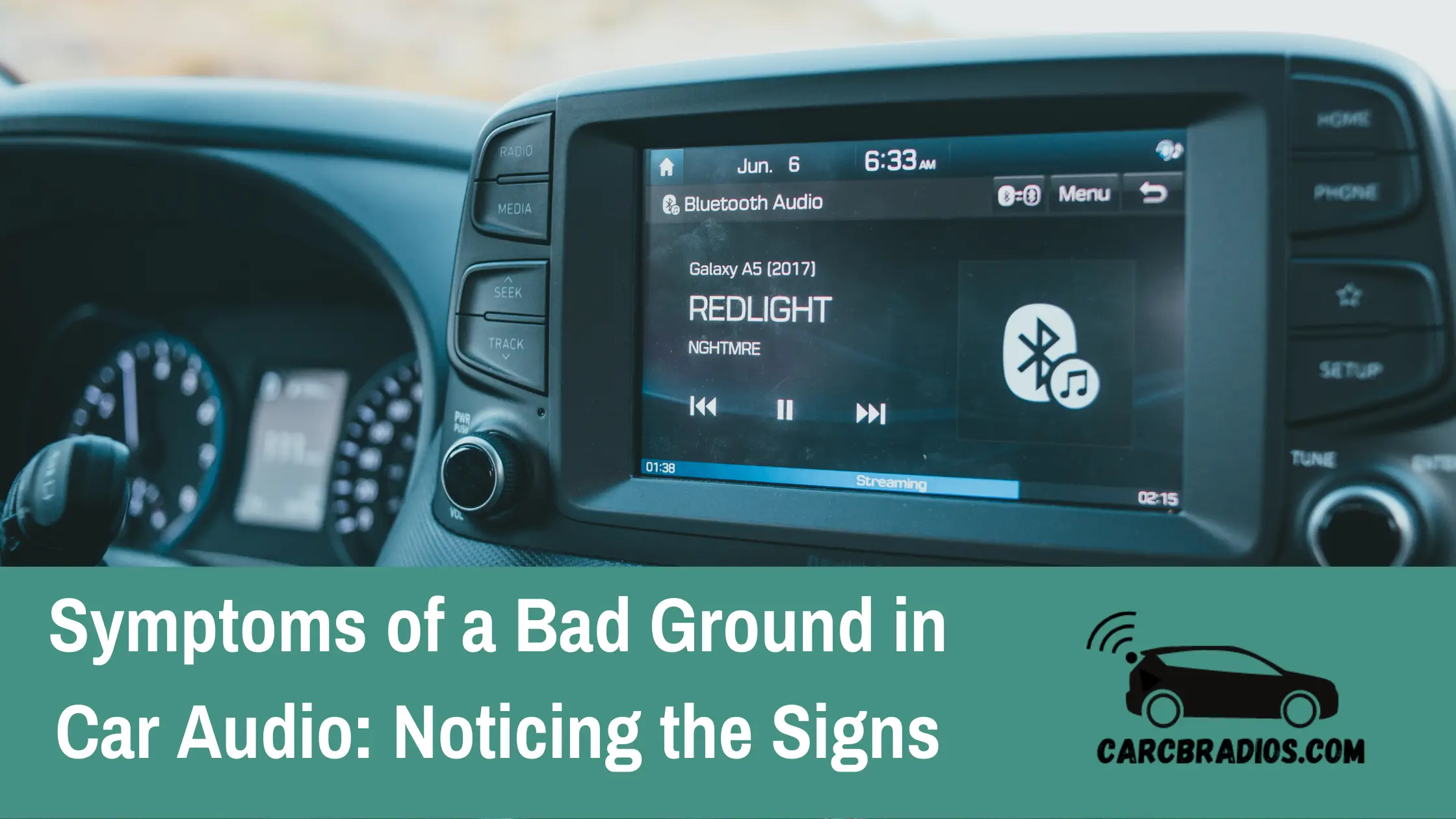By: Jeremy Neisser
As a car owner, it’s important to be knowledgeable about your car’s electrical system. One of the most common causes of electrical problems in a car is a bad ground connection. A bad ground connection can cause a variety of symptoms, including a burning smell inside your vehicle, a loud popping sound when the vehicle is started, and issues with your car’s audio system.
Preventing bad ground on a car amp is essential to avoid these symptoms and prevent accidents. There are several ways to prevent bad ground on a car amp, including using sleeves, using good quality ground wire and connectors, and using a loop isolator or conditioner. In this article, we’ll explore the importance of ground connection, how to prevent bad ground on a car amp, and common symptoms of a bad ground connection.
Key Takeaways
A bad ground connection is a common cause of electrical problems in cars.
Preventing bad ground on a car amp can be done by using sleeves, good quality ground wire and connectors, and a loop isolator or conditioner.
Knowing the symptoms of a bad ground connection can help prevent accidents and further damage to your car’s electrical system.
What Is A Bad Ground Connection?
A bad ground connection occurs when a vehicle has a poor connection to its power or ground cables, or when a low-quality amp is being used. This can cause a range of problems, including bad or erratic engine operation, annoying and distorted sound, and the vehicle not starting. Other issues may include rough or unstable idling, stalling for no apparent reason, and problems with steering and braking.
When a head unit is connected to an amplifier and the vehicle's electrical system, a bad grounding can cause the car amp to fry, blow a fuse, and become unusable. This means that unless the issue is resolved, it will be impossible to listen to music in the car. Fortunately, replacing the ground wire on a stereo is a fairly simple process that can be completed by someone who is handy with a soldering iron and a digital multimeter.
If you are not comfortable fixing the issue yourself, it is always possible to take the car to an auto shop. However, doing so can be expensive, so it is often more cost-effective to fix the issue yourself if you have the necessary skills and tools.
Ground Connection And Its Importance
A good ground connection is essential for the proper functioning of a car's electric system. The grounds consist of two bare metal prongs located at the back of a head unit, which connect to a ground wire running along the outside of the vehicle and into the back of the stereo. Without a proper ground connection, the electric system may not function correctly, leading to problems with the car's audio and other electrical components.
Car Battery's Negative Terminal
I always make sure to check the negative terminal of my car battery to avoid any starting problems. The negative terminal, which is connected to the ground cable or power wire, separates positive and negative impulses that are necessary for the coil to receive electricity. It is important to clean the battery terminals and ensure proper connection to avoid any issues. Poor ventilation can also cause problems, so it's important to make sure the battery is properly ventilated.
Where to Find Ground Wire Connections
Grounding connections are commonly found in various parts of a vehicle, including the battery, starter, alternator, and head unit. These connections are often referred to as "ground" and should not be confused with grounding rods. The rods are connected to the car's frame and conduct electricity from the battery power. If you hear static coming from your car's speakers, it could be due to a poor grounding connection.
10 Common Symptoms of a Bad Ground Connection
As an audio enthusiast, I know the importance of a proper ground connection. When connecting powerful subs, amplifiers, and other components to a car’s audio system, the ground connection is crucial to proper operation. Without a proper ground connection, electricity cannot flow to a sub, speaker, or amplifier. If the connection is interrupted, power will not be sent to the component, and it will not function.
To help you diagnose a bad ground connection, I have listed the following 10 common symptoms of a bad ground on the amp:
#1 Amp Will Not Switch On or Won’t Turn On
If your amp won’t turn on at all, it is necessary to check the amp’s ground wires. If one of the ground straps or wires is broken, the amp won’t turn on. This problem usually occurs due to damaged ground straps or bad contact between the amp’s ground wires and the ground wire.
#2 Whining Noise for Long Periods
A whining noise for long periods is one of the other symptoms that indicate a bad ground on the car amplifier. It could mean that the amplifier is faulty or has loose connections. This symptom is a strong sign, and it could also indicate a broken or loose wire in the wire harness or the connectors on the positive and negative grounding wires. Consult a mechanic to repair or replace the amplifier.
#3 Repeated Turn On and Off of the Amp
One of the most aggravating things that can happen to a car audio system is when it randomly starts switching on and off. If you are unlucky enough to experience this, you will understand why some car owners buy an amp protector, which is designed to reduce ground noise.
#4 Burnt Smell Inside the Vehicle
When you smell a burning smell inside your vehicle, it usually means your amplifier is malfunctioning. This is because a car amp requires power to function, and when the amp’s ground wiring is faulty, the amp won’t work.
#5 Amp Goes on Protect Mode
If you are constantly finding your amp in protection mode, it is most likely due to a bad ground. This occurs when the ground of the amplifier has become faulty. It may also experience thermal shutdown. The input signal being sent out by the amplifier will continually get interrupted, causing the amp to go into protect mode. There are plenty of amplifiers on the market, but they will all go through this same protection mode if the grounding is faulty.
#6 Amplifier Overheating
Overheating is usually the first symptom that indicates that something’s wrong with an amplifier. During amp overheating, the amp wastes away, which can damage it. If the amp overheats, it can damage the wiring in the amp and even damage the speakers, depending on the extent of the damage. Often the amp overheats because of bad ground. Bad grounding is a common source of amplifier problems because it can prevent the battery from recharging properly, and when the ground is bad, the amplifier will be unable to function correctly. For some reason, car audio system speakers would commonly show the symptoms of overheating. It is nothing but a sign that the amplifier speakers are faulty and need to be repaired. Some of the common symptoms that amplifier speakers can show overheating include overheats, over equalization, shorted capacitors, high input gain, open circuits, etc.
#7 Amp Needs More Current
Another symptom of a bad ground is if the amp feels as if it needs more current, but the battery doesn’t provide it. If you turn the amp off and then back on, it may go into protect mode to avoid further damage to internal components. Things can go wrong if an amplifier doesn’t have enough voltage or voltage drop, too, so if the amp doesn’t provide sufficient power to the speakers, the amp may be unable to function properly.
#8 Amp Clipping
If the amp is constantly clipping, it produces flat peaks and troughs in the sound that result in undesirable distortion on particular frequencies. An amplifier clipping is an electrical phenomenon that takes place when the amp output reaches its peak and causes undesirable effects to the vehicle audio system. These effects include clipping distortion, lack of volume, and loss of clarity. With clipping, the signal will jump to a level that is above the threshold, producing distortion. If the amplifier’s output is not regulated by the drivers, it will cause a thermal shutdown, thus damaging the speakers or audio equipment. Clipping can also occur if the audio signal is digitally controlled.
#9 Amp Is Buzzing or Producing a Squealing Noise
A common symptom is buzzing all over the place! In most cases, the source of the same problem can be found quickly, and the solution is easy. However, sometimes the problem can be more tricky to diagnose. For example, if your amp has buzzing issues, it could be bad grounding, but amp
Can Bad Ground on Amp Cause Electrical Problems?
Bad grounding can lead to several electrical problems in your car, including issues with your car's amp. When the connection between the car battery's negative pole and the metal chassis of your vehicle becomes corroded or has a loose connection, it can cause a bad ground on the amp. This can lead to a range of issues, including static noise, low power output, and even damage to the amp.
To prevent this, it's important to visually inspect the common signs that indicate a bad ground connection and be able to fix it. Some signs to look out for include flickering lights, a weak or dead battery, and strange noises coming from your car's audio system.
If you suspect a bad ground on your car's amp, it's best to have it checked by a professional. They can diagnose the issue and ensure that your car's electrical system is functioning properly.
Can Improper Grounding Cause A Blown Speaker?
Improper grounding can be the cause of a blown speaker. Loose wires can draw excessive current into the circuit and damage the speaker's voice coils. It is important to ensure that the patch cables are secured tightly and that the remote turn-on is connected instead of the head unit's power antenna wire. Loose speaker wires can also cause a blown speaker. Checking for loose wires and ensuring proper grounding can prevent permanent damage to your speaker.
Video Explaining How To Properly Ground An Amp
I found a helpful video from Sonic Electronix that explains proper amp grounding.
Summary
To ensure a strong power connection for your amp and prevent it from going into protection mode, it's best to connect the ground wire to a bolt that goes into the bare metal of the car chassis. This will provide a stable and reliable ground for your car audio system. If you have any questions or comments about car audio, feel free to leave them below.
Frequently Asked Questions
Can a poor ground cause an amplifier to go into protect mode?
Yes, a bad ground can cause an amplifier to go into protect mode. This is because a poor ground can cause the amplifier to receive insufficient power, which can cause it to overheat and shut down.
What happens if you don't ground a car stereo?
If you don't ground a car stereo, it can cause electrical interference, which can lead to poor sound quality. Additionally, it can cause the stereo to malfunction and potentially damage the stereo or other electrical components in the car.
How do I know if my amplifier has a bad ground?
If your amplifier has a bad ground, you may notice a variety of symptoms, including poor sound quality, hissing or popping sounds, or the amplifier going into protect mode. You can check the ground connection by inspecting the wiring and ensuring that it is securely connected.
What happens if an amplifier is not grounded properly?
If an amplifier is not grounded properly, it can cause electrical interference, which can lead to poor sound quality. Additionally, it can cause the amplifier to malfunction and potentially damage the amplifier or other electrical components in the car.
How do I check if I have a bad ground in my car?
To check if you have a bad ground in your car, you can use a multimeter to measure the voltage between the ground and the power source. If the voltage is high, it may indicate a bad ground.
Can a bad ground cause an amplifier to overheat?
Yes, a bad ground can cause an amplifier to overheat. This is because a poor ground can cause the amplifier to receive insufficient power, which can cause it to overheat and shut down.

Hi & Welcome!
My name is Jeremy and I have been an avid car nut for many year. My first car was an 1987 Honda CRX. I put in my first Kenwood stereo, amp, 2 10" JLs and a CB Radio in it and have been an avid user of CBs and car radios for years. I'll do my best to share my tips, information and thoughts to help you with whatever question you might have, ABOUT ME
After I graduated from High School, I worked 5 years are Radio Shack and 3 years at Circuit City answering questions and helping customers with various electronics questions.


